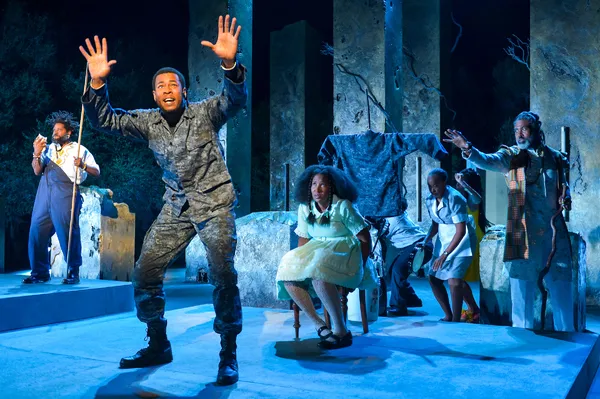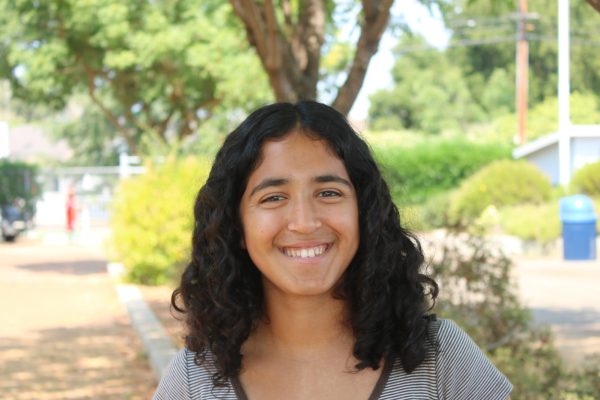To be or not to be: Aldo Billingslea’s advice for theater and beyond
Want to know the secret to good grades? According to Santa Clara University theater professor Aldo Billingslea, it’s all about where you sit.
“When you’re in class,” Billingslea said, pointing across the front and down the middle, “here and here are where the best grades go. The teachers teach on a T.”
American Literature students were treated to a talk by Billingslea on Friday, May 20 during the ACT period. This was in conjunction with the American Literature classes reading “The Mountaintop,” a play by Katori Hall, a Black female playwright. As he regaled them with tales of the theater, Billingslea’s humor and insight enraptured the theater, utilizing the crowd-holding talent built from spending years performing in Shakespeare productions up and down the Peninsula.
“You know he’s legit when he’s got an IMDb page,” english teacher Michael Moul joked when he introduced Billingslea.
While Billingslea was there to discuss “The Mountaintop”, he filled his talk and later conversations with The Talon with pieces of advice for life, often drawn from his own experiences. For instance, he learned the “T” trick fro
m his experience sitting in corners where he could hide himself within the classroom.. However, when he was trying to impress a smart girl in high school, he started sitting on the “T” and his grades went up.
That was a choice he made, and the freedom of choice is an emotive topic for Billingslea.
“Make choices that give you choices,” Billingslea said. “It’s not necessarily [true that] the person that makes a different choice than you [is] a bad person. They’ve just made a different choice than you.”
Billingslea spoke with his twin brother in mind, a bright young man who was often ahead of Billingslea in school. Sadly, his brother fell victim to a drug addiction and never graduated from high school.
“So by the time he’s a high school senior, he’s got a child. Two months before I became a father, my twin brother was a grandfather,” Billingslea said. “So, those are choices that ended up limiting some of his choices.”
While Billingslea made choices different from the choices his brother made, he remains adamant about the importance of the freedom to make choices.
“Quite honestly, particularly in this climate, with Roe v. Wade on the line, those are choices that don’t just affect you, they can take somebody else’s choices away,” Billingslea said.
Billingslea also shared his insight and perspectives as a Black actor with advice on approaching Shakespeare — specifically for students who have trouble seeing themselves in it.
“When I was younger and someone told me to try Shakespeare, the words would not come out of my mouth,” Billingslea admitted. “I was receiving a message that said, ‘Shakespeare is English, English is white, white is not you.’ I didn’t see myself in Shakespeare. Why was Shakespeare for me?”
He credits reading “The Merchant of Venice” with transforming his view of Shakespeare, and specifically a monologue in which a character named Shylock discusses the discrimination he faces simply because he is not Christian. The monologue is filled with powerful prose such as, “If you prick us, do we not bleed? If you tickle us, do we not laugh?” and is centered around the idea of being treated less than by another group.
“I realized that Shylock was speaking my pain — and he was talking about being a Jew. And so I’m like, ‘Oh.’” Billingslea recalled. “His monologue captured it so well that it got me to shift my thinking altogether about Shakespeare, and then started going more and more: ‘This guy is melting my butter, he really, really, really gets me. And I want to do more and more of his work. I want to do everything he’s written.’”
And that remains a goal of his — Billingslea has performed 27 of the 36 Shakespeare works, and hopes to reach 36 out of 36 one day.
“I’ve done ‘Coriolanus’ three times,” Billingslea said. “And you’re like, ‘That’s a Shakespeare play?’ I’m like, ‘Me too, I didn’t know that!’”
Billingslea could not discuss Shakespeare and acting without discussing the experience of being a Black person in theater, and shared some of his frustrations on the issue.
“There’s a Black Ariel, from the ‘Little Mermaid,’” Billingslea said. “And there are still people over here like, ‘Ah, no, we can’t have a Black mermaid!’ And I’m like, ‘We ain’t got mermaids! There ain’t no [such thing as] mermaids!’”
Billingslea shared his thoughts about white people playing Black people’s roles, which the Los Altos High School English department had discussed at length in regards to “The Mountaintop,” through the visual of a pendulum.
“If you think about the movement of a pendulum, that it goes from one side to the other, and we held it, we restrained it, for so long, where it was like we’re just going to hold onto it over here and the only people that can be on stage are white men,” Billingslea said.
He gave examples of icons in pop culture and cinema: Batman, James Bond, Spiderman, the Barbie doll — all white. But he then used the example of Zendaya, who played Peter Parker’s love interest in the most recent Spiderman trilogy.
“We see a little bit of Black representation, versus literally a couple hundred years of the other,” Billingslea said. “So, the pendulum is starting to swing, but it hasn’t swung fully enough that it can come back and find a center.”
Finding our way to such a center, he believes, will take some time to achieve.
“Let the people who were locked out get a little closer to the fire before we push them away from the fire and say, ‘Alright, my turn,’” Billingslea said. “I think.”
Navigating the theater as a Black actor, two things have kept his passion for theater alive for so long: power and relevance. The power of theater, he believes, is touching people and changing minds. While he enjoys eliciting laughs from his audience, the moments that really keep him hooked on theater are the ones that move people.
“Being onstage in those moments where the audience gasps for air, and they ‘Ah!’, an audible gasp, and know that all of those people, in that moment, felt something… you can’t beat that,” Billingslea said.
This is where Billingslea sees the intersection of theater’s ability to move and touch emotions with its capacity to be relevant and have a positive, current impact. Billingslea referenced Othello by Shakespeare, in which Othello murders his wife because he thought she cheated on him, when she really didn’t.
“[Othello] gets fake news, buys into it, and then he goes out and kills somebody,” Billingslea said. “So to be able to [perform] something that I think is relevant, and powerful, and impactful, is an opportunity to have somebody else feel something. If somebody else can feel something they may think something; if they think differently they might behave differently. And then you’re affecting — hopefully — a better world, maybe people making better choices.”
Billingslea continually made connections to current, real-world events issues; he spent a large chunk of his talk discussing status, both external and internal. Grappingly with status has continually found its way into Billingslea’s classroom through exercises and games he likes to have his students participate in. For example, he often has students do an activity where he tells them to imagine someone coming through the doorway and to imagine the entrant is someone of high status. He then asks them to describe what they think makes this imaginary person high status.
“Eventually somebody will say, ‘They’re tall,’” Billingslea said. “And I’ll say, ‘Okay, how tall?’ ‘Six feet three inches’ So I say, ‘That’s really tall for a woman.’ And people shift.”
When he asks how many people envisioned a man, he said that a few will admit to it but most will maintain that they were imagining a woman.
“And I’m like, ‘Mmm, but were you? Were you really though?’” Billingslea laughed. “Because we don’t want to be seen as having a bias, we don’t want to be seen as operating on stereotypes, but we do. And those can get in the way.”
This, Billingslea said, rings as true as in the theater as well as in the world in general.
“When you can’t even imagine a woman as someone of high status, it makes it really hard to elect a woman,” Billingslea said. “But eventually, we will.”
Hear, hear, Prof. Billingslea!




